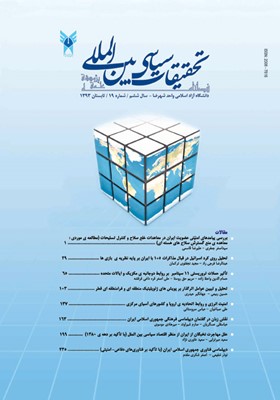علل مهاجرت نخبگان از ایران از منظر اقتصاد سیاسی بین الملل(با تأکید بر دهه 1380)
محورهای موضوعی : علوم سیاسی- روابط بین الملل
سعید میرترابی
1
![]() ,
سعید خاوری نژاد
2
,
سعید خاوری نژاد
2
1 - عضو هیأت علمی گروه علوم سیاسی دانشگاه خوارزمی
2 - دانش آموخته کارشناسی ارشد علوم سیاسی-دانشگاه آزاد واحد چالوس
کلید واژه: مهاجرت نخبگان- هزینه های پژوهشی- جاذبهها - دافعهها-اقتصاد سیاسی بین الملل,
چکیده مقاله :
پژوهش حاضر سعی دارد با توجه به عوامل تأثیرگذار در حوزه اقتصاد سیاسی بین المللی،به شناسایی دلایل مهاجرت نخبگان از ایران از منظر امور آموزشی و پژوهشی و کاستیهای مربوط به آنها در دهه 1380 بپردازد. بخش عمده و برجسته نهادهای آموزشی و پژوهشی کشور بر اساس بودجه وبرنامه های دولت اداره می شوند که در اصطلاح حوزه درگیر شدن دولت در جامعه و حوزه اقتصاد سیاسی خوانده می شود و از سوی دیگر عوامل جاذب نخبگان فکری کشورهای مختلف را می توان در اقتصاد سیاسی جهانی امروز جستجو کرد. هدف مقاله درک درست عوامل مربوط به ساختار آموزش و پژوهش در کشور و نحوه اثرگذاری ضعفهای آن بر تشدید مهاجرت متخصصان و تحصیلکردگان برتر به خارج است. به این منظور در این نوشتار، توزیع بودجه در حوزه آموزشی و پژوهشی، در بستر نظریه جاذبه و دافعه قرار گرفته و موارد دفعکننده داخلی و جذب کننده خارجی شناسایی می شوند که رویهمرفته شرایط بالقوه مهاجرت به بیرون از کشور را ایجاد می کنند. نتیجه بهدستآمده این است که وجود دافعه داخلی در زمینه حمایتهای اقتصادی شامل کمبودها در سرمایهگذاری در بخشهای آموزشی و پژوهشی که در سه حوزه نسبت بودجه پژوهشی به تولید ناخالص داخلی یا بودجه کل کشور، نسبت تعداد پژوهشگران مشغولبهکار به کل جمعیت کشور و ترکیب دولتی ـ خصوصی اعتبارات پژوهشی مورد ارزیابی قرار میگیرد و از طرف دیگر جذابیتهای خارجی در این زمینهها، از مهمترین دلایل اقتصادی مهاجرت فزاینده نخبگان علمی به خارج از کشور در دهه 1380 میباشد.مقاله از روش تحلیلی وتوصیفی در تجزیه وتحلیل داد ه ها بهره گرفته است.
Abstract This article tries to explore the main causes of emigration of Iranian educated specialists from Iran from the view point of shortage of research and educational facilities and problems related to them with focus on 2001 decade (1380-1390 Iranian years). Main part of educational and research institutions are financed and managed by state planning and budget. That is where the government is involved in society and political economy area. On the other hand the factors that attract educated elite of different countries can be seen in world political economy. The aim of the present article is proper understanding of the factors pertaining to the structure of education and research in Iran and the way the weaknesses of this structure affects the intensification of emigration of best educated and specialist to abroad. For this allocation of budget in educational and research fields are examined within the framework of attraction and repulsion theory and the attractive and repulsive factors are identified which creates the potential condition for emigration of the elite to abroad. The finding of the study shows that factor like lack of economic support which includes little investment in educational and research sector are the factors that accelerate emigration of the elite. These factors can be seen in several indexes like the ratio of research budget to gross domestic product of the country, the ratio of active researcher to the population of the country and allocation of research of budget by private and public sector. On the other hand in the developed countries in the above said indexes ample facilities are provided which act as an attractive factor for absorbing educated specialists and elite. The above factors are among the most important economic factors of emigration of scientific elite to abroad in 2001 decade (1380-1390 Iranian years). The paper has used descriptive-analytical method in analyzing data.


